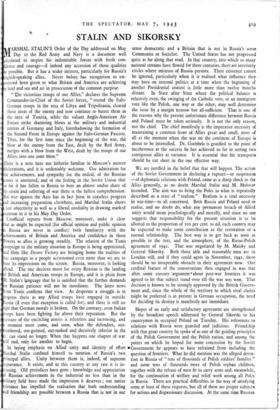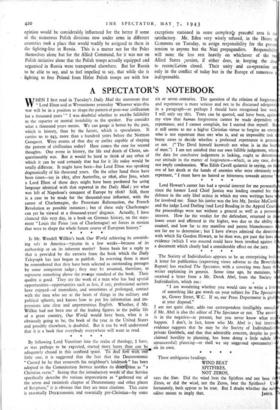STALIN AND SIKORSKY
ARSHAL STALIN'S Order of the Day addressed on May Day to the Red Army and Navy is a document well alculated to inspire his indomitable forces with fresh con- dence and courage---if indeed any accession of those qualities possible. But it has a wider interest, particularly for Russia's nglish-speaking allies. Never before has recognition so un- eserved been given to what Britain and America are achieving y land and sea and air in prosecution of the common purpose.
" The victorious troops of our Allies," declares the Supreme Commander-in-Chief of the Soviet forces, " routed the Italo- German troops in the area of Libya and Tripolitania, cleared those areas of the enemy and now continue to batter them in the area of Tunisia, while the valiant Anglo-American Air Forces strike shattering blows at the military and industrial centres of Germany and Italy, foreshadowing the formation of the Second Front in Europe against the halo-German Fascists. Thus, for the first time since the beginning of the war, the blow at the enemy from the East, dealt by the Red Army, merges with a blow from the West, dealt by the troops of our Allies, into one joint blow."
ere is a note here not hitherto familiar in Moscow's austere clarations, and it is undeniably welcome. Our admiration for e achievements, and sympathy for the ordeal, of the Russian mies is unstinted, and of the feeling in the. Soviet Union that o far it has fallen to Russia to bear an almost undue share of he strain and suffering of war there is the fullest comprehension. of war against the Axis has in fact been in ceaseless progress id increasing preparation elsewhere, and Marshal Stalin shows just objectivity as well as a liberal cordiality in drawing marked nention to it in his May Day Order.
Unofficial reports• from Moscow, moreover, make it clear at as might be expected (for official opinion and public opinion n Russia are never in conflict) both familiarity with the chievetnents of Britain and America and confidence in_ those owers as allies is growing steadily. The relation of the Tunis ampaign to the military situation in Europe is being appreciated, d films like Desert Victory are bringing home the realities of at campaign to a people accustomed even more than we are to ase its impressions on the screen. Russia, moreover, is looking head. The one decisive move for every Russian is the landing f British and American troops in Europe, and it is plain from Stalin's language that he is satisfied that the further demands n Russian patience will not be inordinate. The latest news rom Tunis confirms that view. As desperate a struggle is in rogress there as any Allied troops have engaged in outside ussia (if even that exception is called for), and there is still no Di that German morale is broken. On the contrary, even Italian oops have been fighting far above their reputation. But the essure of the encircling armies is relentless and increasing, and moment must come, and soon, when the defenders, out- umbered, out-gunned, out-tanked and decisively inferior in the if, can stand no longer. When that happens one chapter of war ill end, only for another to begin.
In laying emphasis on Allied unity and identity of effort arshal Stalin confined himself to mention of Russia's two rincipal allies. Unity between them is, indeed, of supreme portance. It exists, and in this country at any rate it is in- reasing. Old prejudices have gone ; knowledge and appreciation Russian achievement in the industrial no less than in the ilitary field have made the impression it deserves ; our native olerance has impelled • the realisation that both understanding d friendship are possible between a Russia that is not in our sense democratic and a Britain that is not in Russia's sense Communist or Socialist. The United States has not progressed quite as far along that road. In that country, into which so many national streams have flowed for three centuries, there are inevitably circles where mistrust of Russia persists. Their existence cannot be ignored, particularly when it is realised what influence they may have on internal politics at a time when the beginning of another Presidential contest is little more than twelve -months distant. In State after State where the political balance is relatively even, the swinging of the Catholic vote, or an immigrant vote like the Polish, one way or the other, may well determine the issue by a margin narrow but all-sufficient. That is one of the reasons why the present unfortunate difference between Russia and Poland must be taken seriously. It is not the only reason, nor the chief. The chief manifestly is the imperative necessity of maintaining a common front of Allies great and small, most of all at the moment when the war on the continent of Europe is about to be intensified. Dr. Goebbels is gratified to the point of incoherence at the success he has achieved so far in setting two contiguous allies at variance. It is essential that his transports should be cut short in the one effective way.
We are justified in the belief that that will happen. The action of the Soviet Government in declaring a rupture—or suspension —of diplomatic relations with Poland, came as a sharp shock to the Allies generally, as no doubt Marshal Stalin and M. Molotov intended. The aim was to bring the Poles to what is repeatedly described as a state of " realism." Realism is a vital necessity in war-time—to all concerned. Both Russia and Poland need to realise, and no doubt do, what any permanent breach of Allied unity would mean psychologically and morally, and since no one suggests that responsibility for the present situation is to be allotted m the proportion of zoo per cent. to nil, each country may be expected to make some contribution to the restoration of a normal relationship. The best way is to get back as soon as possible to the text, and the atmosphere, of the Russo-Polish agreement of 1941. That was negotiated by M. Maisky and General Sikorsky.. Both those able and reasonable men are in London still, and if they could agree in November, 1941, there should be no insuperable obstacle to their agreement now. One cardinal feature of the conversations then engaged in was that after some cursory argument • about post-war frontiers it was agreed to let that subject stand over till the war was won. That decision is known to be strongly approved by the British Govern- ment and, since the whole of the territory to which rival claims might be preferred is at present in German occupation, the need for deciding its destiny is manifestly not immediate.
Hopes of an early and satisfactory agreement are strengthened by the broadcast speech addressed by General Sikorski to his countrymen in occupied Poland on Tuesday. His references to telations with Russia were guarded and judicious. Friendship with that great country he spoke of as one of the guiding principles of the Polish Government and the Polish nation, and among the points on which he hoped for some concession by the Soviet • Government he appears to have refrained from including the question of frontiers. What he did mention was the alleged deten- tion in Russia of " tens of thousands of Polish soldiers' families " and some tens of thousands more of Polish orphan children, together with the release of men fit to carry arms and, meanwhile, for the continuation of welfare and relief work among all Poles in Russia. There are practical difficulties in the way of satisfying some at least of these requests, but all of them are proper subjects for serious and dispassionate discussion. At the same time Russian opinion would be considerably influenced for the better if some of the numerous Polish divisions now under arms in different countries took a place that would readily be assigned to them in the fighting-line in Russia. This is a matter not for the Poles themselves alone but for the Allied Command, for it was not on Polish initiative alone that the Polish troops actually equipped and organised in Russia .were transported elsewhere. But for Russia to be able to say, and to feel impelled to say, that while she is fighting to free Poland from Hitler Polish troops are with few exceptions stationed in some completely peaceitil area is n satisfactory. Mr. Eden very wisely refused, in the House Commons on Tuesday, to assign responsibility for the cresen tension to anyone but the Nazi propagandists. Responsibili will none the less rest heavily on whichever of the Allied States persists, if either does, in keeping the d to reconciliation closed. Their unity and co-operation n only in the conflict of today but in the Europe of tomorrow indispensable.



























 Previous page
Previous page